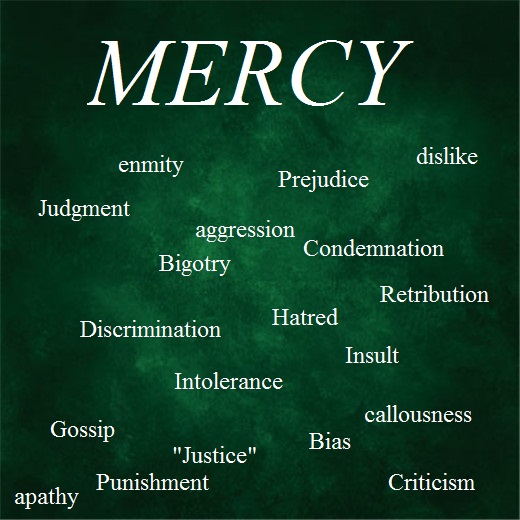James 2:13 … on Mercy & Judgment (05/29/17)
“Mercy triumphs over judgment.” ~ James (James 2:13)
This verse is – especially as far as conservative Christians are concerned – one of the more important verses in the entire Bible; for it reminds us that we have all been called by Jesus to attain our Salvation not by criticizing or condemning the beliefs of others (or via trying to convert them to our own beliefs – see Jeremiah 31:31-34 & Hebrews 8:8-13), but rather by actively & selflessly Loving them (see Matthew 7:21-24, Matthew 24:12-14, John 13:15-17 et al) – especially one’s enemies (Matthew 5:43-48) &/or the downtrodden in one’s neighborhood (Matthew 25:35-40). Indeed, it is impossible to truly Love others from a place of pride; it is impossible to truly Love others without first becoming “humble as a very young child” (see Matthew 18:3-4, also Matthew 23:12) – a sacred state of being that we cannot enliven while judging others or criticizing their chosen spiritual beliefs in any way (see Matthew 7:1-2 & John 8:7) …
And indeed, although it is important to condemn actions that are unjust or directly harmful to others (John 7:24), when we condemn those who are perpetrating the same we are actually indirectly-yet-powerfully encouraging them to re-commit those same sins in the future … On the other hand, when we have the compassionate humility needed to truly Love them anyway – especially while we are condemning their selfish, pain-inducing choices (while we are standing between them and their victims with forgiveness on our lips and compassion for them in our Hearts) , we free them to recant & atone – we enable them to “repent” (the Greek “metanoeo” in Matthew 4:17’s “Repent, for the Kingdom of Heaven is already at hand”, a word meaning not “to self-criticize” or “to admit fault”, but rather “to completely alter one’s behaviors” – see Strong’s #3340) and thereby find their Salvation (a la Matthew 9:6 – “the Son of Man has the authority on Earth to forgive sins” [also John 20:23] … Better stated, we all have the power during our conscious lives to be Kind to trespassers, and thereby inspire them to do similarly – and thereby allow them to work out their own forgiveness – and thereby free themselves to attain their own Salvation, a la Matthew 6:14-15 “For if you forgive others their trespasses, your heavenly Father will also forgive you; and yet if you do not forgive others, neither will your Father forgive your trespasses”).
And interestingly enough, it comes as no surprise that the ancient Greek of this very verse supports the aforementioned contentions. For “mercy” here is actually the Greek word “eleos,” a word that indeed means “mercy” (or alternatively, “compassion”); especially shown towards one who has wronged us (see Strong’s #1656)! … Also, “triumphs” here is actually the Greek word “katakauchatai,” a word that means “to exult over”; especially the exultation shown by a victor over the one he has soundly defeated (see Strong’s #2620). Finally, “judgment” here is actually the Greek word “krisis,” a word that means “to give a negative verdict” or “to criticize” (see Strong’s #2920).
So we can see that what this verse is actually saying is the following: “Showing compassion to the enemy who is criticizing or condemning us or others is the way to completely & fully defeats them.”
Amen … Let it be so.





 ;
;